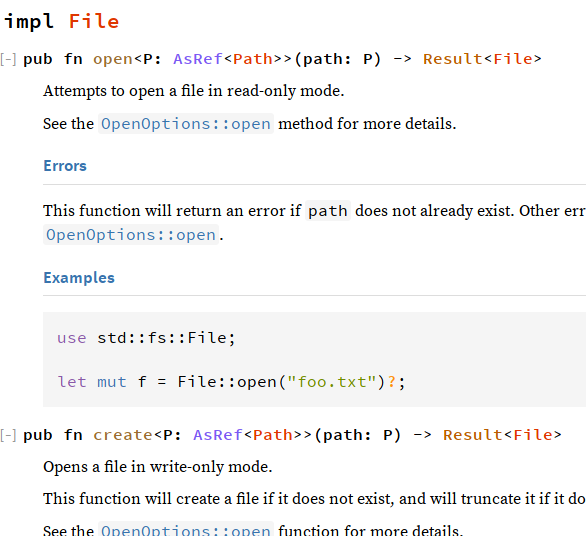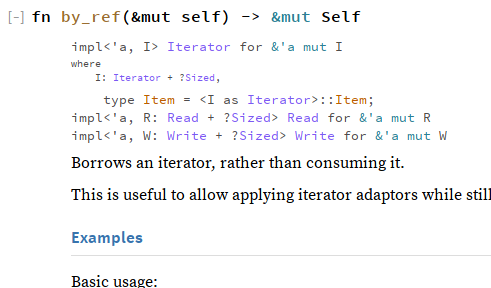… previously in the unstable core::num::Float trait.
Per https://github.com/rust-lang/rust/issues/32110#issuecomment-379503183,
the `abs`, `signum`, and `powi` methods are *not* included for now
since they rely on LLVM intrinsics and we haven’t determined yet whether
those instrinsics lower to calls to libm functions on any platform.
rustdoc: don't crash when an external trait's docs needs to import another trait
Fixes https://github.com/rust-lang/rust/issues/48414
When resolving intra-paths for an item, rustdoc needs to have information about their items on hand, for proper bookkeeping. When loading a path for an external item, it needs to load these items from their host crate, since their information isn't otherwise available. This includes resolving paths for those docs. which can cause this process to recurse. Rustdoc keeps a map of external traits in a `RefCell<HashMap<DefId, Trait>>`, and it keeps a borrow of this active when importing an external trait. In the linked crash, this led to a RefCell borrow error, panic, and ICE.
This PR manually releases the borrow while importing the trait, and also keeps a list of traits being imported at the given moment. The latter keeps rustdoc from infinitely recursing as it tries to import the same trait repeatedly.
A new section is added to both both struct and trait doc pages.
On struct/enum pages, a new 'Auto Trait Implementations' section displays any
synthetic implementations for auto traits. Currently, this is only done
for Send and Sync.
On trait pages, a new 'Auto Implementors' section displays all types
which automatically implement the trait. Effectively, this is a list of
all public types in the standard library.
Synthesized impls for a particular auto trait ('synthetic impls') take
into account generic bounds. For example, a type 'struct Foo<T>(T)' will
have 'impl<T> Send for Foo<T> where T: Send' generated for it.
Manual implementations of auto traits are also taken into account. If we have
the following types:
'struct Foo<T>(T)'
'struct Wrapper<T>(Foo<T>)'
'unsafe impl<T> Send for Wrapper<T>' // pretend that Wrapper<T> makes
this sound somehow
Then Wrapper will have the following impl generated:
'impl<T> Send for Wrapper<T>'
reflecting the fact that 'T: Send' need not hold for 'Wrapper<T>: Send'
to hold
Lifetimes, HRTBS, and projections (e.g. '<T as Iterator>::Item') are
taken into account by synthetic impls
However, if a type can *never* implement a particular auto trait
(e.g. 'struct MyStruct<T>(*const T)'), then a negative impl will be
generated (in this case, 'impl<T> !Send for MyStruct<T>')
All of this means that a user should be able to copy-paste a synthetic
impl into their code, without any observable changes in behavior
(assuming the rest of the program remains unchanged).
rustdoc: Populate external_traits with traits only seen in impls
This means default methods can always be found and "Important traits" will include all spotlight traits.
No longer parse it.
Remove AutoTrait variant from AST and HIR.
Remove backwards compatibility lint.
Remove coherence checks, they make no sense for the new syntax.
Remove from rustdoc.
Record all imports (`use`, `extern crate`) in the crate metadata
This PR adds non-`pub` `use` and `extern crate` imports in the crate metadata since hygienic macros invoked in other crates may use them. We already include all other non-`pub` items in the crate metadata. This improves import suggestions in some cases.
Fixes#42337.
r? @nrc
* Visibility was missing from impl items.
* Attributes and docs were missing from consts and types in impls.
* Const default values were missing from traits.
This unifies the code that handles associated items from impls and traits.
show in docs whether the return type of a function impls Iterator/Read/Write
Closes#25928
This PR makes it so that when rustdoc documents a function, it checks the return type to see whether it implements a handful of specific traits. If so, it will print the impl and any associated types. Rather than doing this via a whitelist within rustdoc, i chose to do this by a new `#[doc]` attribute parameter, so things like `Future` could tap into this if desired.
### Known shortcomings
~~The printing of impls currently uses the `where` class over the whole thing to shrink the font size relative to the function definition itself. Naturally, when the impl has a where clause of its own, it gets shrunken even further:~~ (This is no longer a problem because the design changed and rendered this concern moot.)
The lookup currently just looks at the top-level type, not looking inside things like Result or Option, which renders the spotlights on Read/Write a little less useful:
<details><summary>`File::{open, create}` don't have spotlight info (pic of old design)</summary>

</details>
All three of the initially spotlighted traits are generically implemented on `&mut` references. Rustdoc currently treats a `&mut T` reference-to-a-generic as an impl on the reference primitive itself. `&mut Self` counts as a generic in the eyes of rustdoc. All this combines to create this lovely scene on `Iterator::by_ref`:
<details><summary>`Iterator::by_ref` spotlights Iterator, Read, and Write (pic of old design)</summary>

</details>
DefaultImpl is a highly confusing name for what we now call auto impls,
as in `impl Send for ..`. The name auto impl is not formally decided
but for sanity anything is better than `DefaultImpl` which refers
neither to `default impl` nor to `impl Default`.
This commit moves the `crates` method to a query and then migrates all callers
to use a query instead of the now-renamed `crates_untracked` method where
possible.
Closes#41417
Should hopefully more accurately reflect what's happening! This commit also
removes the cache in the cstore implementation as it's already cached through
the query infrastructure.
The main use of `CrateStore` *before* the `TyCtxt` is created is during
resolution, but we want to be sure that any methods used before resolution are
not used after the `TyCtxt` is created. This commit starts moving the methods
used by resolve to all be named `{name}_untracked` where the rest of the
compiler uses just `{name}` as a query.
During this transition a number of new queries were added to account for
post-resolve usage of these methods.